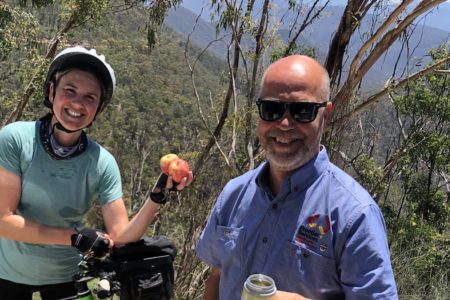I’m writing this column just a few days after one man’s actions in central Melbourne’s Bourke St brought death, fear and anxiety to so many people. Also on my mind is a personal anniversary that causes me sadness and an awareness that many people are carrying sadness, anger and despair.
And while all this is going on the Church offers us the gift of the season of Advent. The season of Advent is the season that invites us to prepare for the coming of Jesus Christ so we might see him at work in the world today and be ready to greet him in the Christmas season.
This season invites us to ponder where we see Christ coming in the present, how Christ was at work in history and from this to have hope about how Christ might be present in the future.
Advent begins with a gospel reading that gives us an image of the second coming of Jesus, an event that will usher in the end of the world.
This year, the reading is from Luke 21 and has images of the Earth in distress, people fainting and the heavens being shaken. Such images can seem strange or even frightening with its focus on destruction and death. They can invoke fear and cause us to become anxious about our own salvation, the salvation of those we know and the salvation of the church.
I don’t believe this is the way we should read such a passage. This reading about destruction arises from the prophetic tradition that warns against spiritual blindness. This blindness prevents us from seeing God’s ways in the world and holds us back from participating in God’s actions. The prophetic scriptures wake us up and reassure us that God’s love will redeem and sustain us and all creation.
So often God’s action in the world happens in places and with the people we least expect.
God’s reign, which is among us but still coming, does not conform to the ways of this world. It upends the norms with God’s glorious, loving redemptive actions. The remaining gospel readings for the season of Advent take us back to the beginning to help us understand what the reign of God was like and how we can participate in God’s loving redemptive action in the world. In the opening chapters of Luke’s gospel we hear God chooses the overlooked ones to bear God’s child and speak of God’s transforming love. Elizabeth, childless and old, and her husband, Zechariah, are given the gift of a son who will bear witness to Jesus and prepare people for his coming.
Mary, young, betrothed and ordinary is chosen to be the God-bearer, the one in whose body the baby Jesus will grow and be born, and in whose body the pain of grief at the end will be felt.
Elizabeth, Zechariah and Mary show the wider implications of their being chosen. God’s is a way of loving redemption which lifts up the powerless, feeds the hungry, scatters the proud and remembers God’s promise to God’s people.
God’s way brings light where there is darkness, forgiveness of sin and hope for salvation. This way brings judgement on those who use power to exclude and exploit, on those who lack mercy and those who do not feed the hungry and empower the poor.
These readings, which take us back to the beginning, show us what the end is like. At the end what will prevail is God’s way in the world. This is a loving transformation of our ways so that they become God’s way. This is why we should not fear the end, but be filled with hope for God’s coming.
So, as I turn my mind to Advent conscious of despair about events in our city, aware of the hurt many are feeling and continuing to live with my own grief, I turn in hope towards God whose coming brings a word of judgment against the prevailing powers that is, in fact, a word of love.
I turn in hope towards the child Jesus, whose birth brings the good news that God’s love is at work in the world renewing, saving and transforming us.
This Advent let us stay alert for God’s love which will likely surprise us by revealing itself in unlikely people and places.
And let us keep our hearts open to being renewed by love which holds and remakes the world.



